Jamaican coffee beans offer a rich, sweet flavor that is truly delicious. If you’re looking for gourmet coffee, give these Jamaican coffee brands a try.
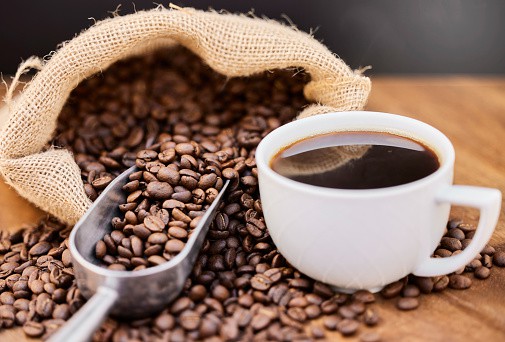
Jamaican cuisine is known for lots of spice and an explosion of flavor, but did you know Jamaica is also a producer of gourmet coffee?
Jamaica’s blue mountain region, on the eastern side of the country, is home to the highest point on the island at 2,000+ feet above sea level. It is a cool, cloudy spot with rich soil that receives plenty of regular rain. The volcanic soil and high altitudes make for perfect conditions for producing coffee beans.
The coffee produced in Jamaica is known for its sweet, rich flavor, mild acidity, and high quality. In fact, coffee is such an important export for the island that the coffee produced is held to incredibly high standards, making Jamaican coffee highly sought after around the world.
Despite there being other kinds of coffee grown in the country, Jamaican Blue Mountain Coffee is a favorite amongst locals and tourists alike. This, combined with the limited supply that comes from the small region, means that Blue Mountain Beans can come at a hefty price.
Below we have detailed out our favorite choices for every kind of coffee drinker. We have the top picks for authentic, already-roasted JBM coffee beans for coffee enthusiasts that want the best quality. We also have choices for green beans (for those that like to roast their own), ground coffee (for those that want an easy morning), and blended coffee (for those that want to try Blue Mountain Coffee for a lower price point. Keep reading for our recommendations for each!
Origin of Coffee in Jamaica
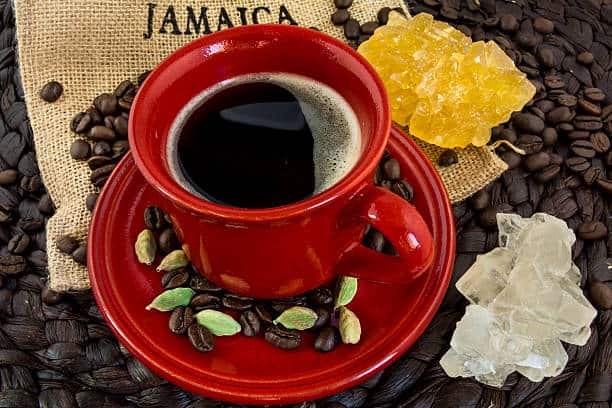
Coffee was first developed in Arabia, and the plant made its way around the world as trade became more popular. In the 1700s coffee was brought to Martinique, and Governor Sir Nicholas Lawes brought the first coffee plant to Jamaica from Haiti in 1728.
The fertile ground on the island proved to be ideal for the plant, and very quickly the island became a hub for coffee production. By 1814 more than 15,000 tons of coffee beans were exported from the island, according to the Jamaican Agricultural Commodities Regulatory Authority.
Following the end of slavery on the island, coffee production declined drastically as plantations struggled to find good labor.
In 1942 the larger producers of coffee began to compete for business with the United States and Canada and the quality of the coffee began to suffer. Coffee was such a crucial part of Jamaica’s economy that responsible growers requested government assistance to protect the industry and the Coffee Industry Board was created.
Today most coffee producers in Jamaica are fairly small operations, producing less than 1% of what is produced in Colombia.
All exports of Jamaica Blue Mountain coffee are monitored, licensed and sampled before exportation to ensure quality. The board also has set standards for the growing, harvesting, processing and marketing of Jamaican Blue Mountain Coffee.
With all the oversight on the product, you can rest assured if you are purchasing Jamaican Blue Mountain coffee, it is only the best product.
Jamaican Coffee in Japan
Coffee connoisseurs are obsessed with Jamaican Coffee Brands, but it can be difficult to get a hold of! Japanese consumers are fans of the delicate flavors and clean taste of the coffee from this region. Consequently, Japan contracts over 65-80% of the beans from the Blue Mountains of Jamaica.
This mutually beneficial partnership began shortly after the end of World War II, when Jamaican Blue Mountain Coffee began being exported to Japan. By the 1960s, the two countries had decided to form an economic alliance that would benefit both of them.
Japan received rights to Jamaican Blue Mountain coffee, which immediately began being exported there in droves. Japan marketed that the Jamaican coffee was a favorite amongst British royals, which made it even more desirable to the Japanese.
The marketing tactic worked, and Japan’s coffee culture boomed into a very lucrative industry! Jamaican blue mountain coffee sat at the top of this industry as one of the most luxurious kinds of coffee a consumer could buy. At one point in time, Japan received over 90% of all Jamaican Blue Mountain coffee.
How to Ensure Your Coffee is Authentic

With Japanese consumers enjoying the majority of Jamaican Coffee brands, this leaves the rest of the world scrambling for a chance to buy this coffee. With high demand and supply limited, many companies attempt to imitate the real deal. There are a few ways you can ensure that you get the real thing, even when purchasing online:
- Check the Packaging for Location: Usually Blue Mountain Coffee is grown, roasted, and packaged all in Jamaica. If you see a sticker on the bag indicating that the coffee was produced in the United States, Europe, or anywhere else, you likely aren’t getting true blue mountain coffee.
- Pay Attention to the Price: The average cost of a pound of this coffee is between $50-$65. If you are paying significantly less than that, the lower price is probably indicative of fraudulent marketing.
- Look for the Stamp: Make sure to keep an eye out for the stamp of approval from the Coffee Industry Board of Jamaica. Because this coffee is in the top 10 most expensive coffees in the world, it is globally protected! Each coffee comes with a globally protected certification mark that ensures that the coffee is authentic and genuine. The seal exists on every authentic Jamaican Blue Mountain coffee brand. It features a photo of a mountain with a wooden barrel and coffee beans. The image is encompassed by a border (usually blue when the image is in color) with white words that say “Jamaica Blue Mountain Coffee”.
Where to Buy Jamaican Blue Mountain Coffee
As mentioned, coffee lovers LOVE Jamaican coffee, which means it can be hard to get your hands on! There are a few ways to make sure you get the coffee you’re hoping for.
- Funnily enough, because Jamaican Blue Mountain Coffee is so popular in Japan, it is sometimes easier to get Jamaican Blue Mountain Coffee beans from a Japanese website rather than a Jamaican one. Though it is expensive, you can buy green beans directly from Japanese websites.
- If you get a hold of a grower directly, you can have green beans or coffee shipped directly to you. This could also be an expensive option once you factor in shipping costs.
- The best way to get the highest quality Jamaican coffee for an affordable price is to buy it locally online. Make sure to keep an eye out for that official seal of authenticity described above. This is how you will make sure that you are getting what you pay for and avoiding a blue mountain scam.
Best Jamaican Blue Mountain Coffee Brands
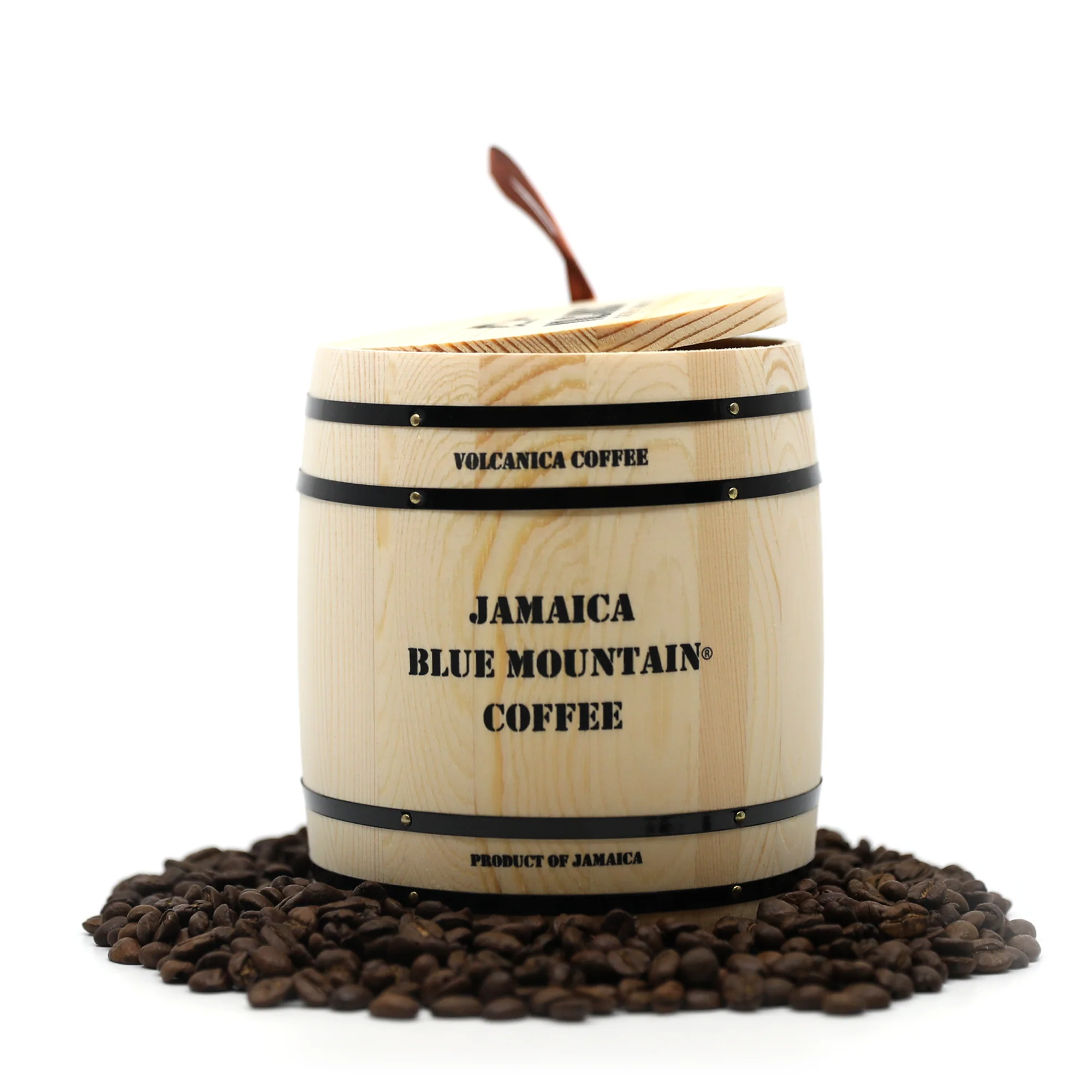
Volcanica Jamaican Blue Mountain Coffee (Wallenford Estate)
Widely considered some of the best coffee in Jamaica and the world, this Volcanica coffee is world-renowned for its rich flavor and unique aroma. It has a fruity taste, often described as orange, as well as very light acidity. This makes it a great choice for those that want a strong aroma with a balanced taste.
For a premium price, you can get Volcanica Peaberry Coffee Beans, which comes as a medium roast and is hand picked to ensure the highest quality.
Batches of this coffee are guaranteed delivery between 3-30 days of roasting so that you can rest assured that you are getting a fresh batch every time. It is shipped via Atlanta, Georgia to ensure fresh coffee to anywhere in the United States.
Jablum Coffee
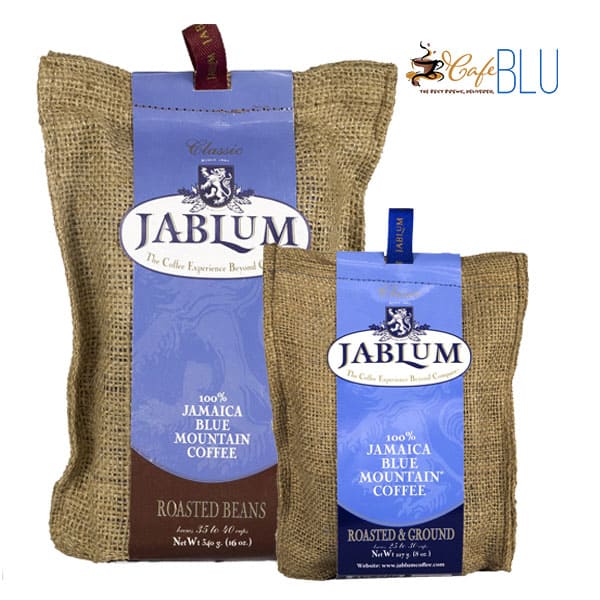
This brand has a very bold taste without much bitterness or bite. It is smooth and fresh, and carries the same smooth taste and orange notes of classic JBM coffee.
I would recommend purchasing this coffee whole, grinding by hand, and brewing in a french press for the best results. It has large beans that are consistent in size and a roast that is slightly less than Volcanica. This coffee features nutty overtones with a mild aroma!
Green Coffee Traders
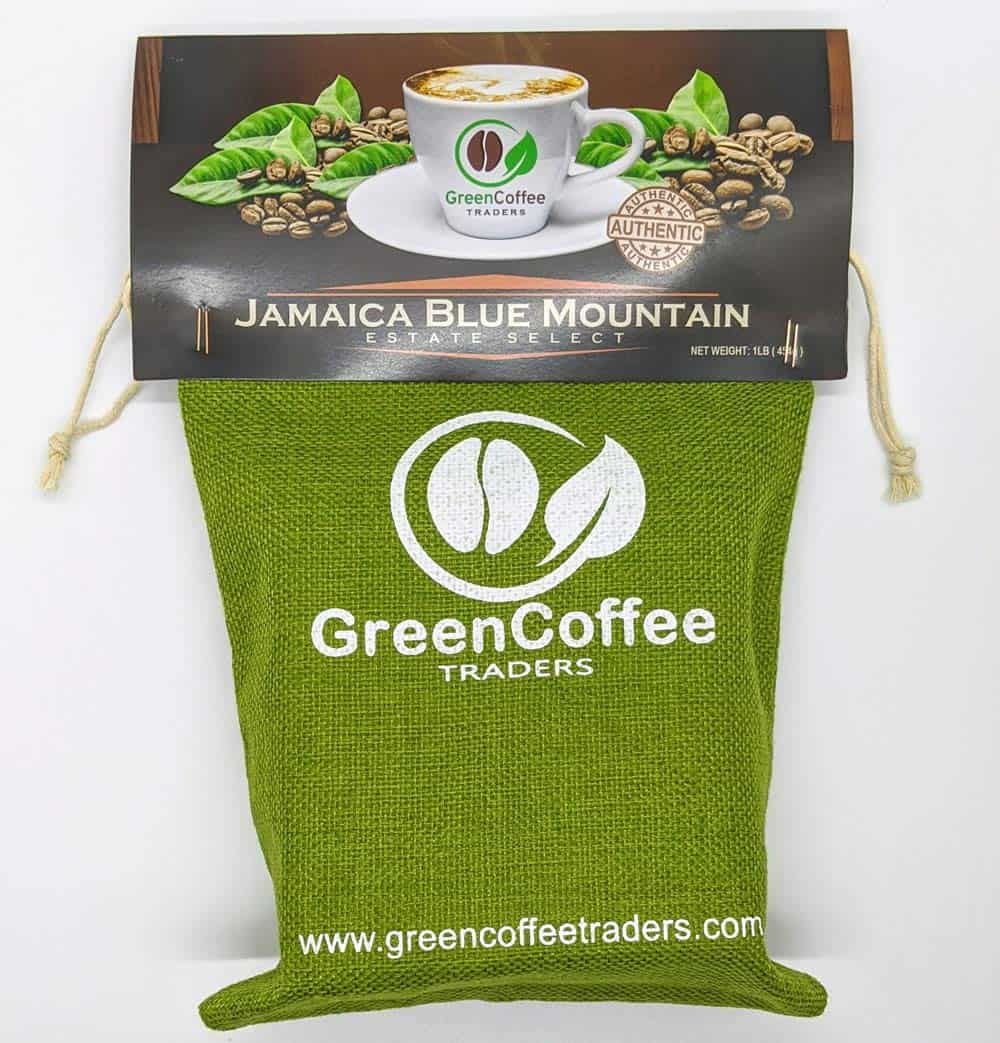
Green Coffee Traders is a great place to get unroasted green coffee beans, which is perfect for someone that wants to roast their coffee beans themselves. This is great for getting the freshest coffee possible. The brand sells many brands of green beans (like this Hawaiian Kona Coffee), and you can certainly use it to buy Blue Mountain Coffee!
If, instead, you’d prefer an already-roasted batch of beans, Green Coffee Traders can provide that as well! In this case, they will wait until you order to roast the beans for you, making sure you have the freshest roasted coffee possible. This does sometimes mean waiting a little bit longer to get your coffee order.
Coffee Traders One-Hundred Percent Jamaica Blue Mountain Coffee
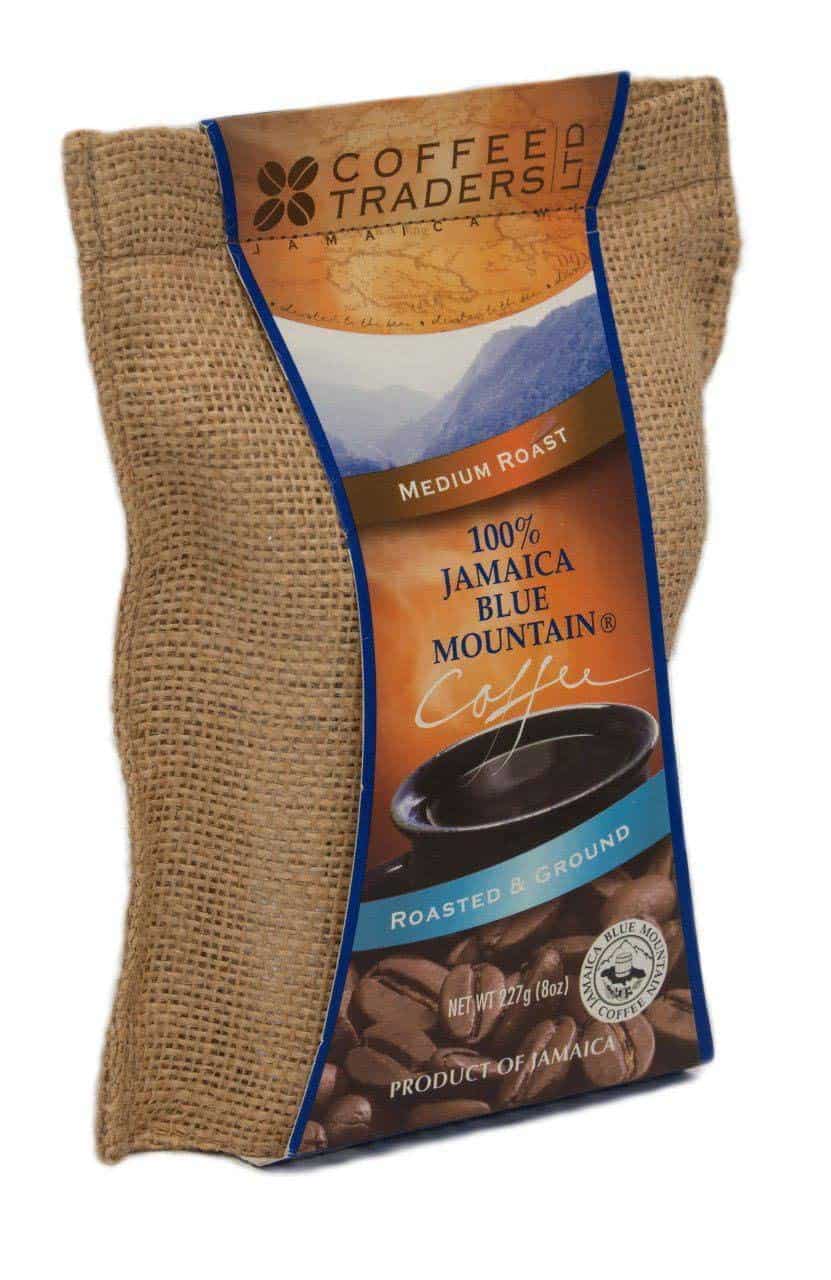
We highly recommend grinding your own coffee to make sure that you get the most freshness possible. However, if you like ground coffee, Coffee Traders is a great brand to try.
This brand is available in smaller quantities so that you can make sure to use it up before it loses its flavor. This is 100% Blue Mountain Coffee, NOT a blend. Even when ground, it still contains the classic orange notes and smooth feel that is so coveted in those delicious coffees from Jamaica.
The ground beans from this brand do enough, but if you want to be transported back to Jamaica, this ground coffee misses the mark just a little. It’s not the brand’s fault. The lack of freshness and boldness is a trade off that you get when purchasing an already-ground package. You can also buy this brand in whole beans if you prefer.
Magnum Exotics Jamaican Blue Mountain Coffee Blend
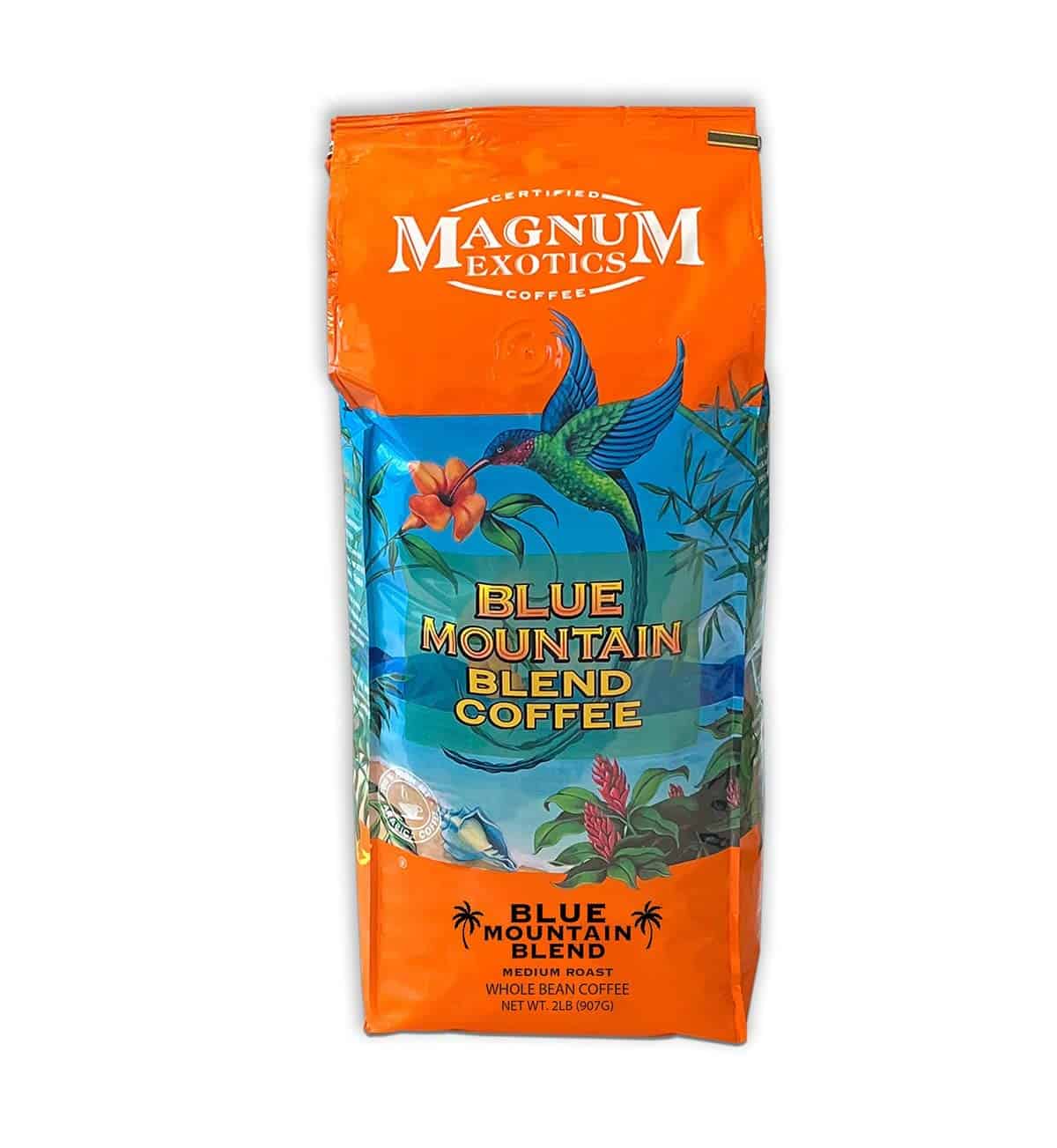
If you want to try Jamaican coffee without the high price, Magnum Exotics is a good way to give it a go. This brand is much more affordable than the other coffee brands on this list (at around $28 per pound!) but there is a reason for this… Magnum Exotic is only about 20% Blue Mountain Coffee, with the rest of the beans coming from other locations.
It’s a good way to get a feel for what a cup of Blue Mountain Coffee might taste like. But keep in mind that the orange notes and smooth feel of Blue Mountain Coffee will likely be lost in this cup.
Did you enjoy this article about Jamaican Coffee Brands? If so, make sure to check out these other articles I picked out just for you:


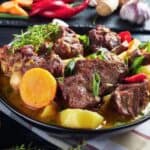
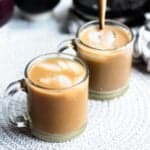
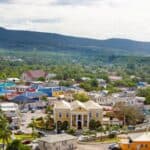
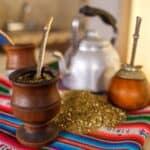
Leave a Reply